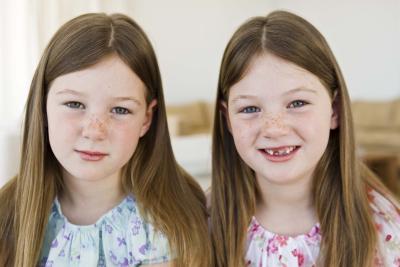Teething is an important part of childhood development. Infants use their sensitive oral faculties to explore their environment and will gum and chew any object they can fit into their mouths. Primary teeth, sometimes referred to as baby teeth, are essential for helping children chew their food and learn to speak. Baby teeth also serve as a placeholder of sorts for the permanent teeth that will emerge later.
Time Frame
Baby teeth usually start coming in when a child is between four and 12 months old. The lower middle incisors are usually first two that come in, followed by the four incisors on the upper jaw. Once teething begins, a new tooth usually comes in around once per month until all 20 baby teeth are in place. Most children have all of their baby teeth by the time they reach three years of age. The baby teeth start falling out to make room for permanent teeth at around age six or seven. The process continues until all baby teeth are gone around the time the child enters her teens.
Types
Baby teeth come in three different types matching upper and lower jaws. The incisors, the front teeth, are the first baby teeth to come in, and usually the first that are lost. We use incisors to cut our food. The first molars, larger teeth in the back of the mouth, usually come in next, and are used for grinding and mashing food. The canines appear between the time when the first and second molars come in. These pointy teeth are useful for tearing food. Baby teeth usually fall out in the same order they came in.
Considerations
Baby teeth are designed to fall out to make room for the permanent teeth, but they still need attentive care. Tooth decay can begin as soon as baby teeth appear. The American Dental Association recommends cleaning baby teeth under two years old with a toothbrush and water. Children two years old and up may use a small amount of fluoride toothpaste on their toothbrush.
Loose Tooth
Baby teeth usually fall out without any outside help from parents. The tooth starts to get loose once the root begins to dissolve. Kids will naturally wiggle a loose tooth once they notice it. The process typically takes a couple of months and involves little, if any, pain. Parents may be tempted to help the process along, but pulling a baby tooth before the root is completely dissolved can be painful and cause infections. It’s usually best to let the tooth fall out on its own.
New Teeth Care
The loss of baby teeth and the emergence of permanent teeth is an ideal time for parents to reinforce good dental hygiene practices with their kids, according to MayoClinic.com. Parents should encourage their children to brush at least twice per day and help their children floss in the evening before bed. Kids may retain their permanent teeth in good condition for a lifetime if they establish good dental habits early and have regular dental checkups.





